Sammath Naur Pt. 6: Gollum’s Fall, plus [long] essay.
~*~
Warnings: Again, my apologies to dial-up viewers for the many images.
Frodo and Gollum’s fight at the brink is to me iconic, from the opening struggle to the moment when they sail over the edge like warring, fallen angels. Talking about it with verangel in the previous entry, it occurred to me that the film fight is the visualization of the one described in the book, but before Frodo's finger is bitten off, when he's still invisible. Here again is Tolkien's description of it:
[Sam] groped forward, and then he saw a strange and terrible thing. Gollum on the edge of the abyss was fighting like a mad thing with an unseen foe. To and fro he swayed, now so near the brink that almost he tumbled in, now dragging back, falling to the ground, rising, and falling again.
I suppose the film-makers felt they couldn't really do justice to the book fight with an invisible Frodo, so they saved it for when he was visible again-minus the end of his finger, but not his fury. It's a wonderfully choreographed film fight, all the more striking from a distance. The two figures are stark against the golden glow of the background, yet the swirling mists and vapours soften the scene at the same time, giving their desperate struggle an otherworldly look, almost dream-like.
Re-visiting this scene in order to make a fullscreen image of Gollum falling into the fiery abyss, I found the whole sequence so visually and emotionally arresting I decided to make an abbreviated set to post here.
Gollum's fall as seen in the film is a long one; seen in screencaps, it seems to take an eternity. Watching him descend both expands and concentrates the impact of his fall, letting the viewer watch each frame as separate moments, frozen in time, each frame recording a gradation in Gollum’s transition from euphoria to bewilderment to horror to sorrow and dismay at the loss of the treasure he had finally regained. He does not seem even to feel what must be an excruciating death, sinking into molten lava, only the loss of the Ring. It is as if he is already being consumed before the flames ever touch him, the Ring already burning him up from inside. Why should he notice the fire outside? The out-of-focus frames toward the bottom showing Gollum first entering the lava are brilliant, I think. They are very intense, but the out-of-focus quality, perhaps, gives them a surreal look. Looking at them is like looking through a window at Gollum in hell.
It was from this fate that Frodo was saved, Gollum effectively taking his place in the inferno. That Frodo had a sense of this-in the book-is made clear by what he says to Sam about forgiving Gollum, after the Ring is destroyed. Frodo knows what he (and Middle-earth) owes to Gollum's misstep, even if Gollum had not intended to bring this boon. The world, and Frodo, lives. After his initial euphoria passes, Frodo will still have to struggle with the continuing desire for the Ring, and feelings of shame for still desiring it, but his lot will not be Gollum's.
When I look at Gollum's face in this sequence I can’t help feeling pity for him, even love. Wicked as he has been, he is pitiful, so utterly overwhelmed and outmatched by a power far greater than he. In this doomed contest, his end is a terrible one.
Following the screencaps there is a rather extended essay concerning why I think Gollum fell. In it I talk about the importance of Gollum’s oath, and the power words can have in Tolkien’s narrative world. I have also posted book texts bearing on Gollum's oath below the essay.
~*~
Book scene, continued, from Mount Doom:
‘Precious, precious, precious!’ Gollum cried. ‘My Precious! O my Precious!’ And with that, even as his eyes were lifted up to gloat on his prize, he stepped too far, toppled, wavered for a moment on the brink, and then with a shriek he fell. Out of the depths came his last wail Precious, and he was gone.
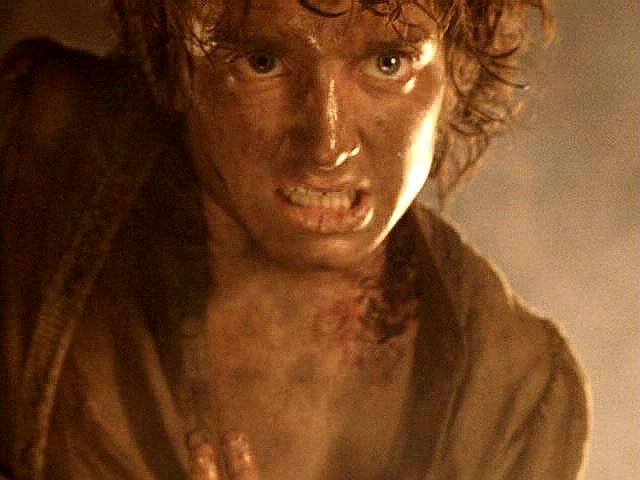
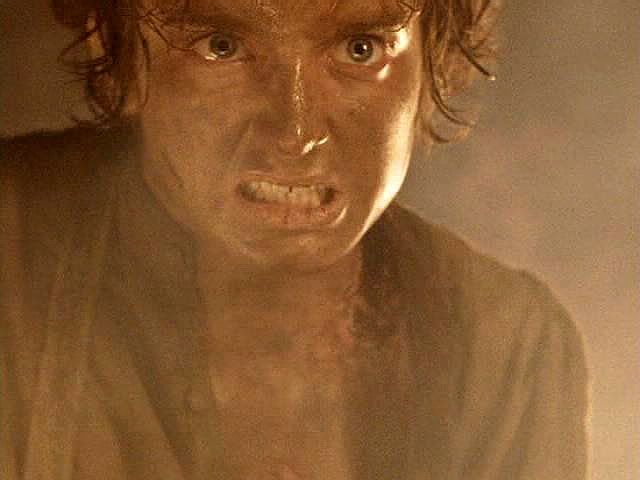
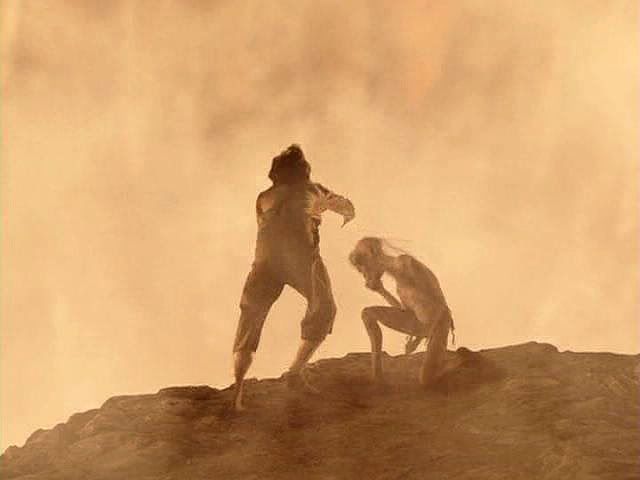

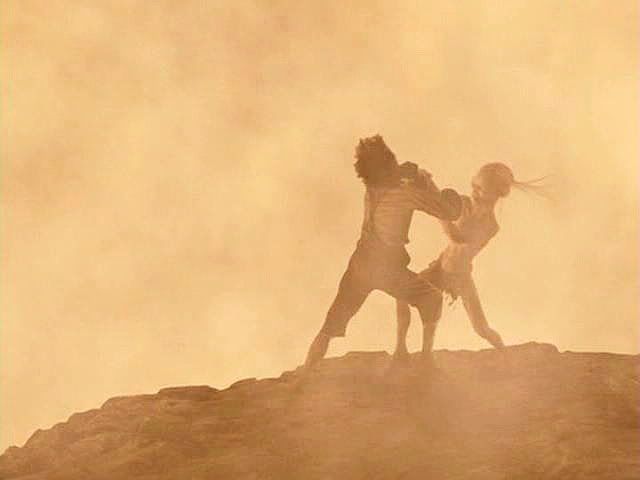

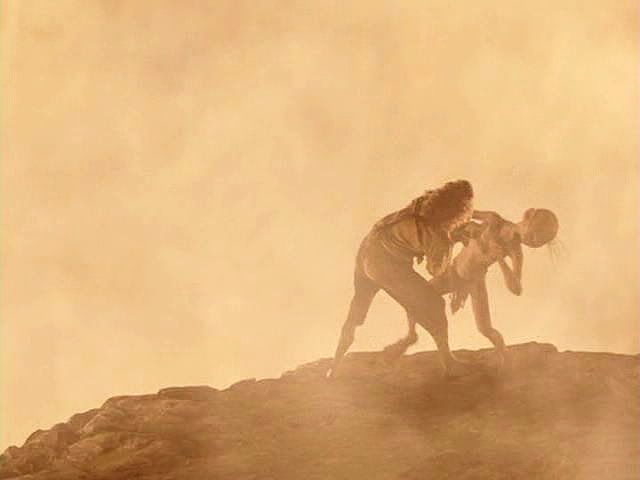
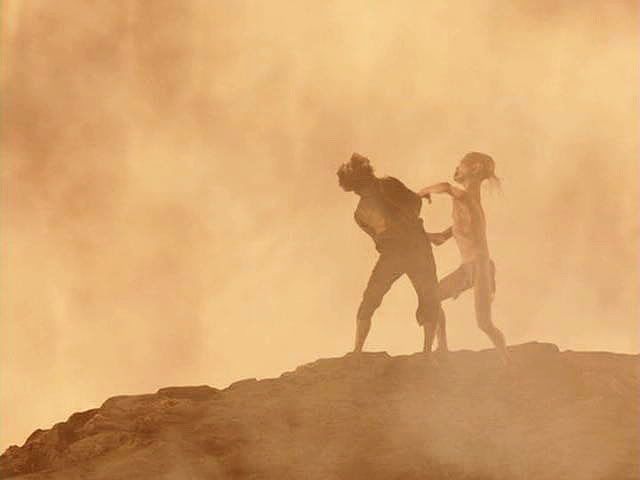
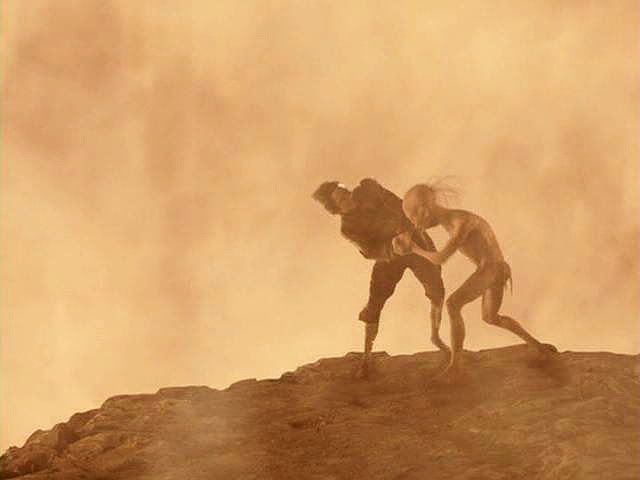
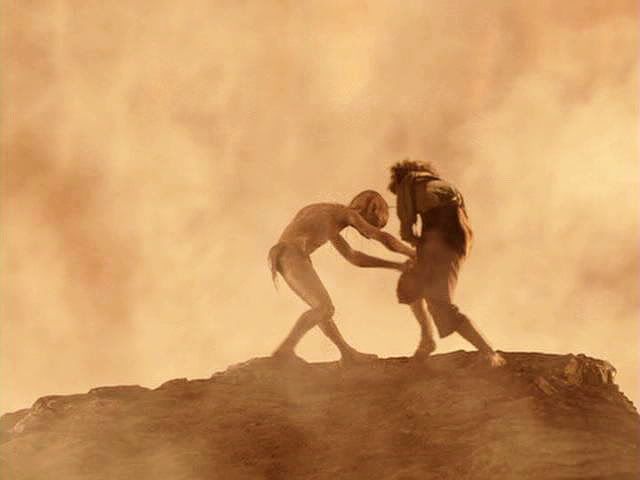
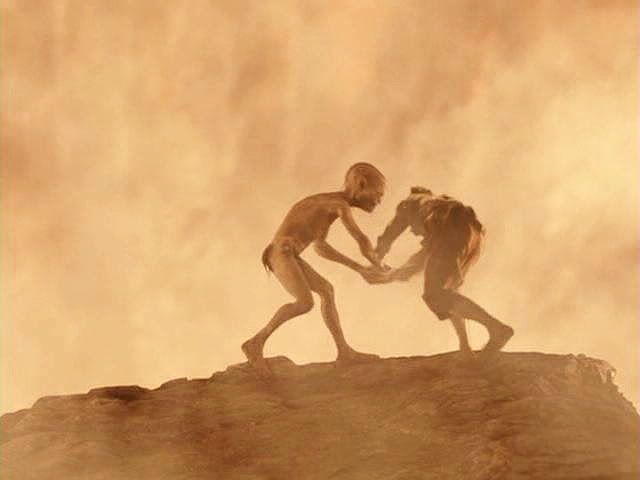
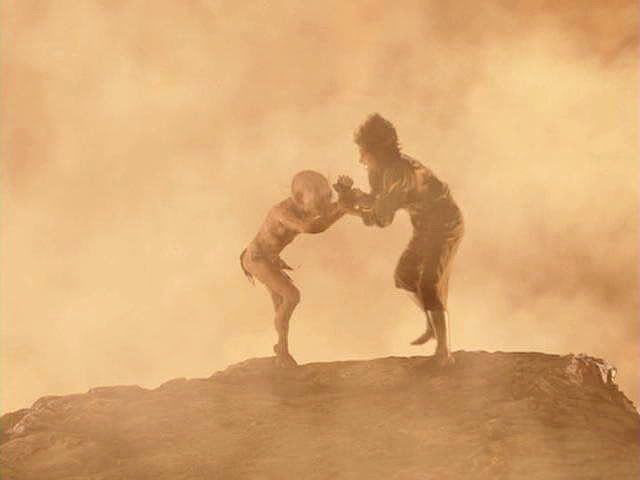
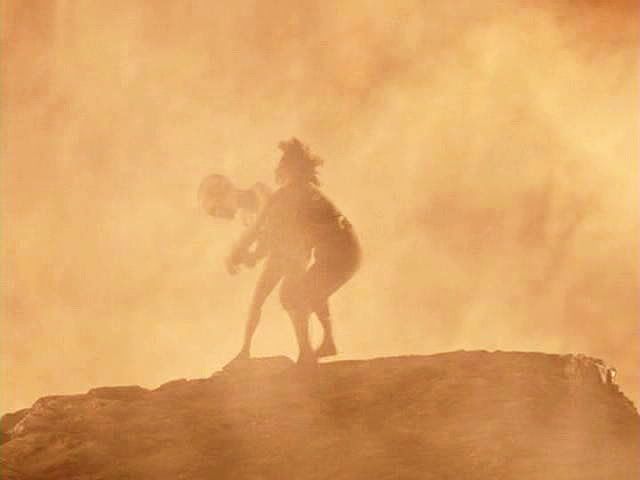

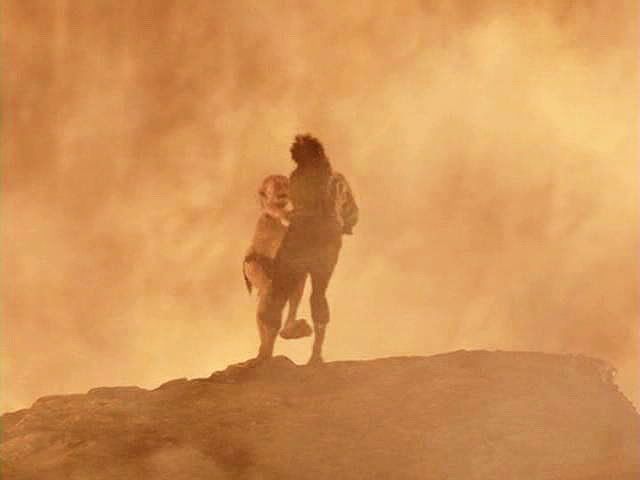
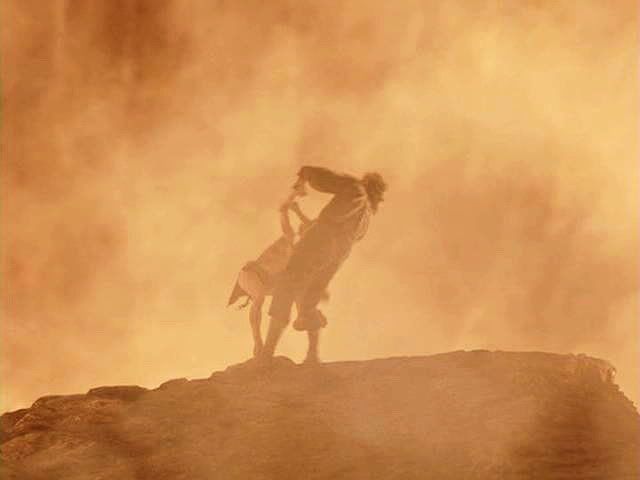
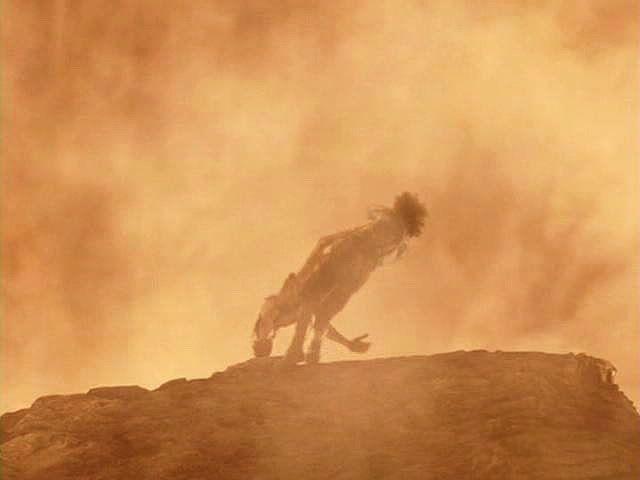
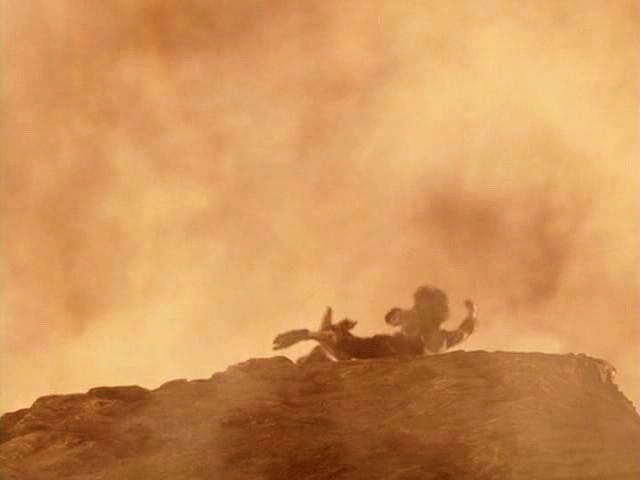
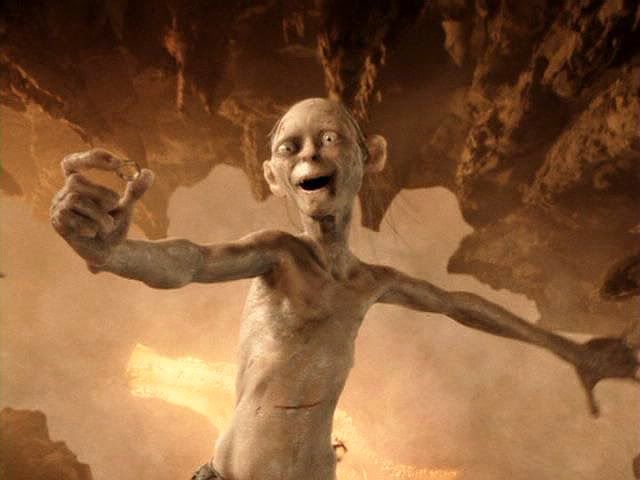
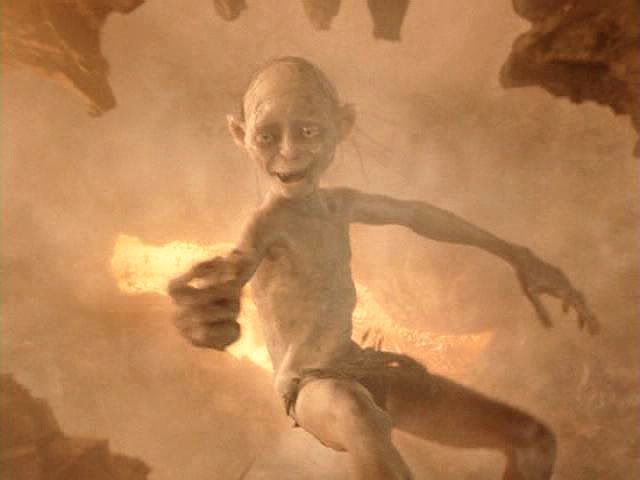
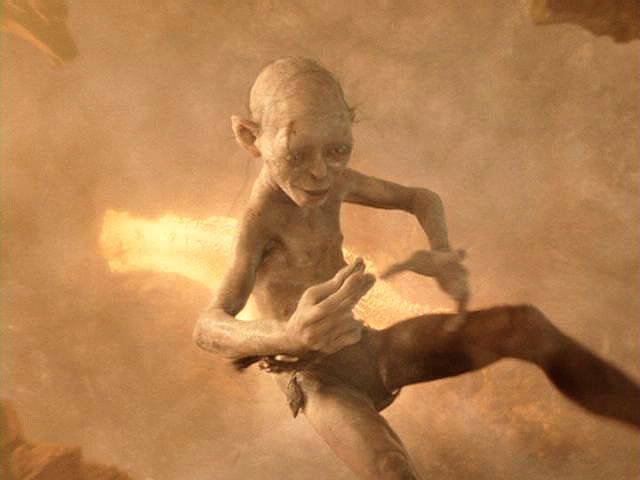
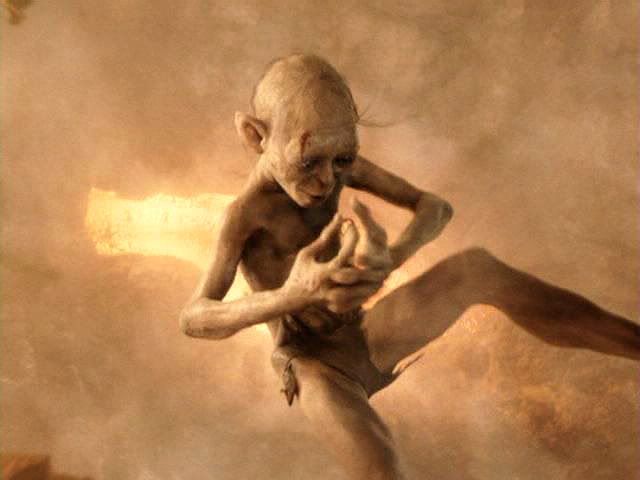
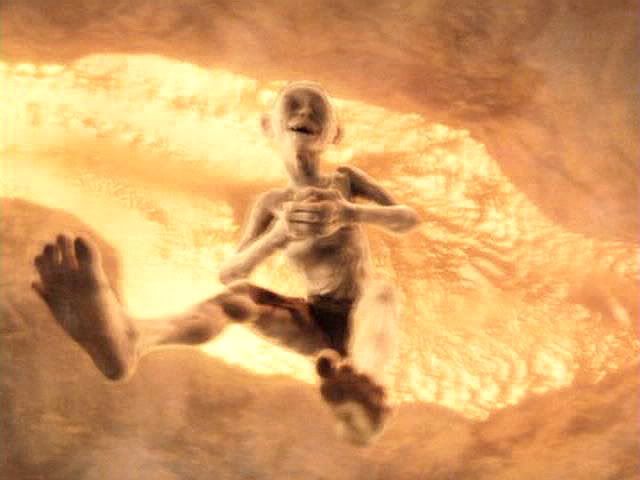


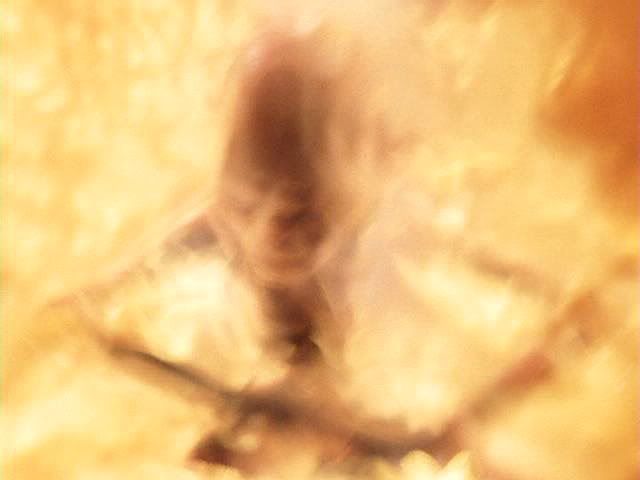
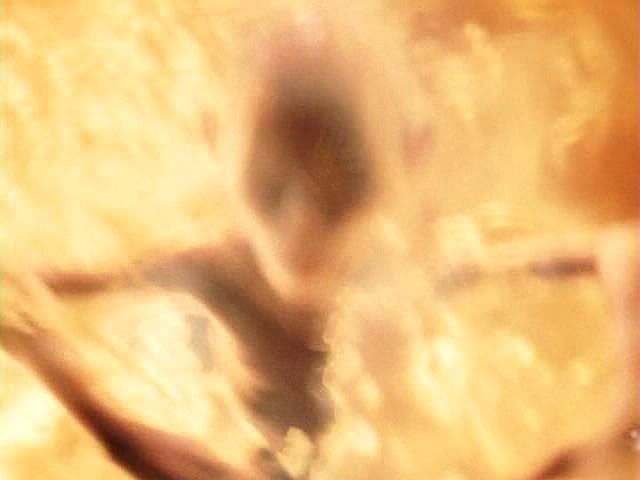
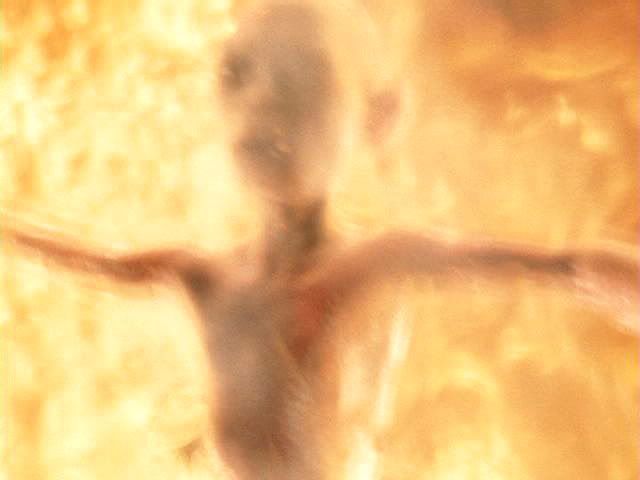
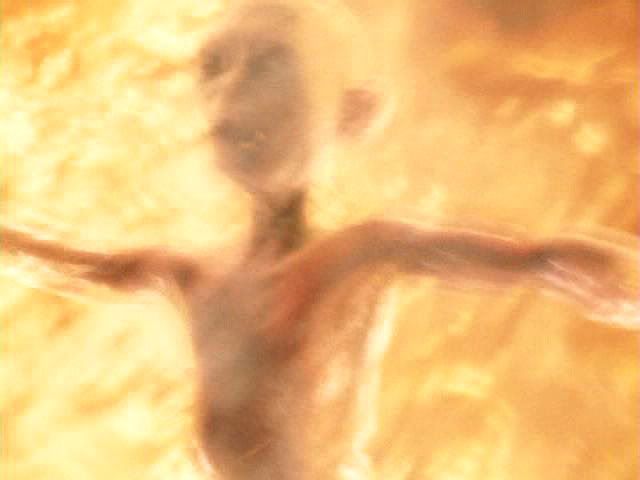
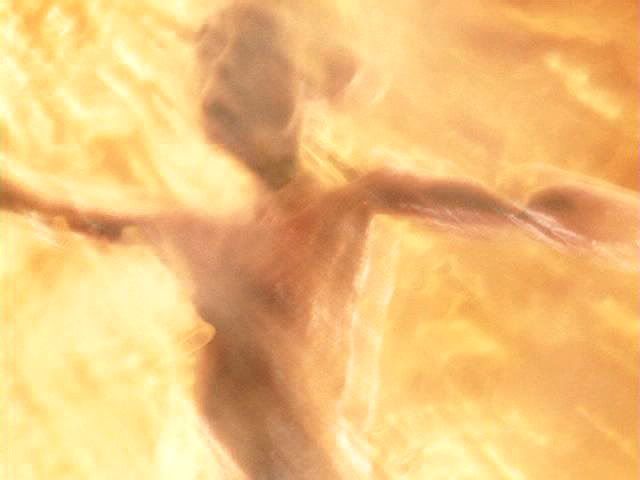
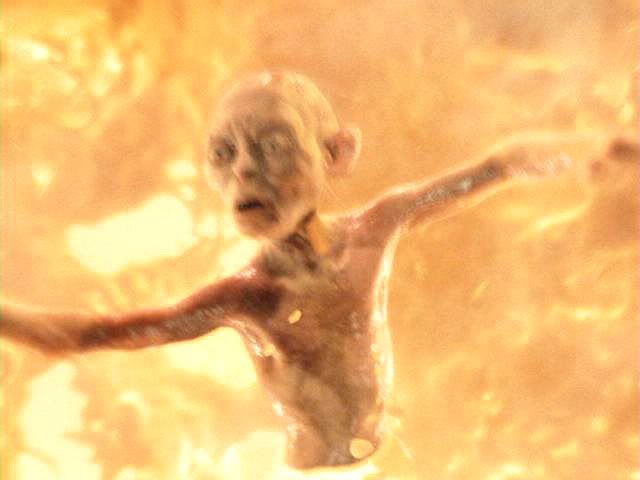
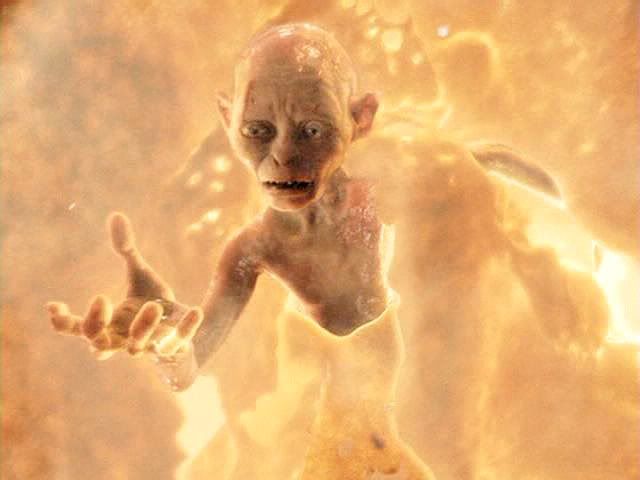
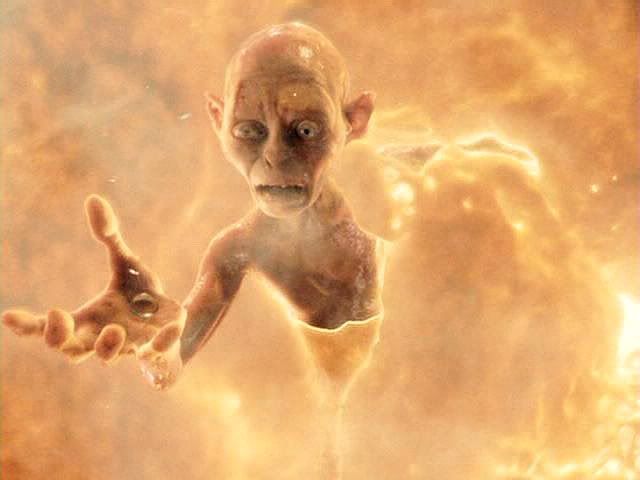
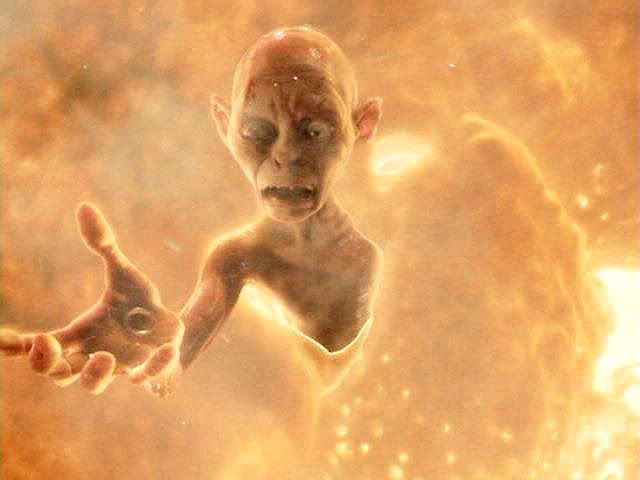
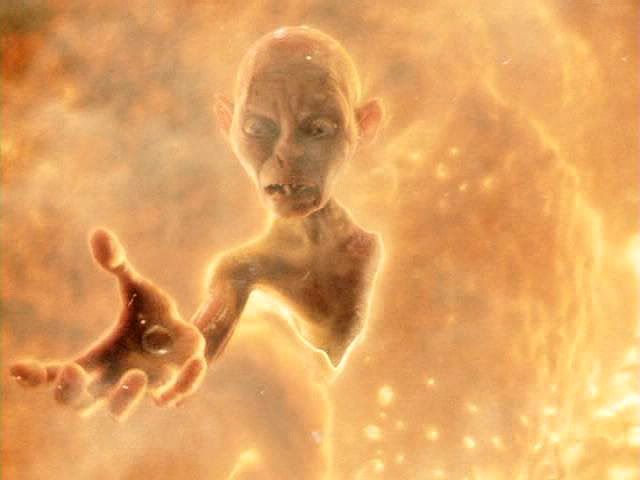
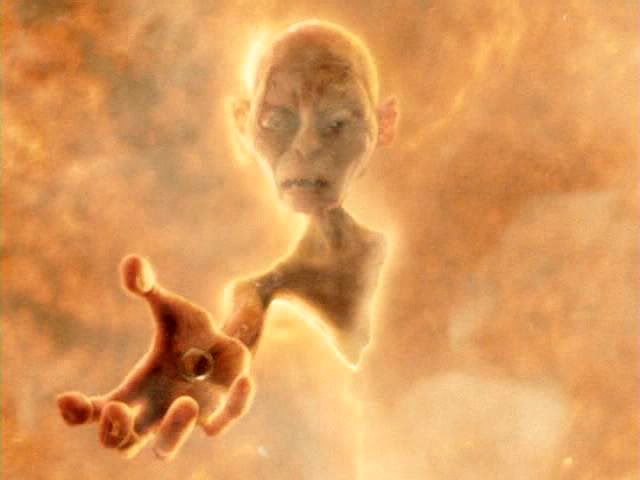

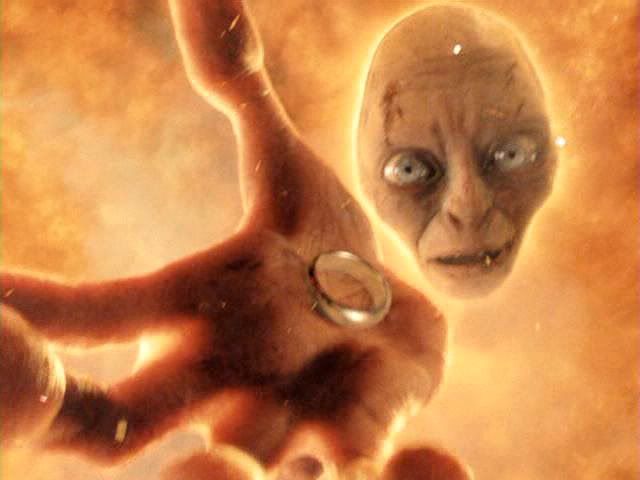
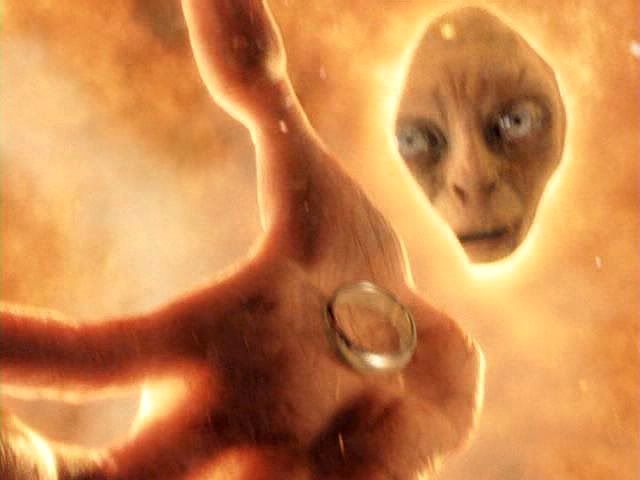
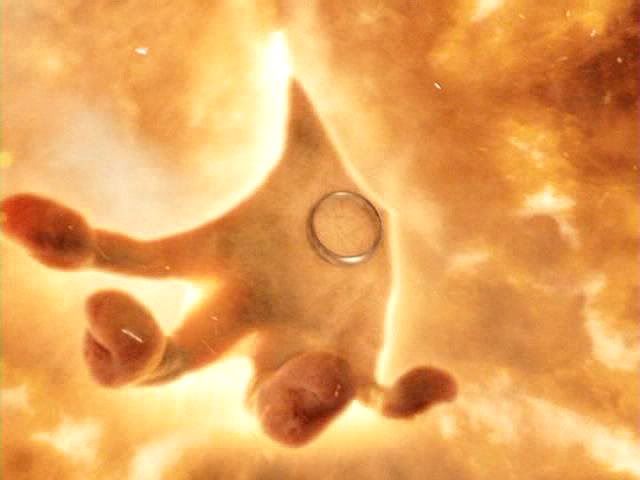


I. Long Essay on the power of words in Tolkien, especially as they pertain to Gollum's oath.
In Tolkien’s secondary world, not just the one depicted in LotR, the power of words is very great, for good and for ill. For good, there’s the song of the Ainur, of course, through which they sing Arda into being. It is not clear to me if their song had actual words. I tend to think not, picturing the Ainur communicating in some way more like the Ring-bearers' "mind-speech". Perhaps the Ainur “mind-sang” the world into being, with a music that is music, yet transcends it, using words that are words, yet which transcend what one thinks of as words. When Morgoth brings about the death of the Two Trees and Valinor is darkened, Yavanna, sorrowing, “sings” over them until, at last, they bear the fruits that will become the Moon and Sun.
In LotR, in the world the Ainur’s song created, Middle-earth, speech-both spoken and sung-also has creative, restoring power. Goldberry’s song restores and refreshes Frodo’s spirit. Tom Bombadil’s songs subdue Old Man Willow and the Barrow Wight, not only when Tom sings them, but when Frodo does. Singing the words Tom has taught him and his friends before they set out, he sings in a small desperate voice at first, but his voice grows until the chamber seems to be filled with the noise of drum and trumpet. It is as if the power is in the songs themselves, rather than in the singer, a power that grows in the act of singing. Tom’s song, even sung by Frodo, breaks the hold of the Wight's dark spell and sets the hobbits free. It sets them free literally, by summoning Tom, who comes to them and sings to banish the Wight and release the dreaming hobbits from their bonds. But Tom's song has the power to set them free from the inside, too, lifting the heart of the singer and rousing him to action. Even before Tom comes, Frodo, singing, in spite of the terror of the situation, feels his courage rise within him so that he can act.
When Sam can't find Frodo in the Tower and sits on a step, feeling defeated, the song that comes to him is freeing in the same way. The tune is one of Mr. Bilbo's, but the words, it says, were Sam’s own, coming to him "unbidden". His first tentative murmurings grow to an echoing sound. The dark-defying, stirring verses of "In Western Lands" don't summon Tom Bombadil to his rescue, but they bring “new strength” to Sam’s heart and limbs. And Frodo, in the upper chamber, hears the song and sings back to him, which is how Sam finds him. Thus Sam's and Frodo's hearts are "freed", in a sense-freed from the despair that makes it impossible to act.
In the First Age, Lúthien goes to look for Beren, imprisoned in Angband under Thangorodrim. Desperate to find him in Morgoth’s dungeons, she sings. Beren hears her song, his spirits lift, and he sings back to her. Lúthien comes to him and releases him, and, together, they escape.
When Fëanor’s son, Maedhros is captured by Morgoth and left to hang by his wrist from the sheer side of Thangorodrim (also in the First Age), Fingon enters Morgoth’s domain to look for him. Fingon nearly despairs in his search, but, in defiance of the Orcs hiding all around him, he sings a song of Valinor, “that the Noldor made of old,” in the time before Fëanor’s oath brought strife between the Eldar. Maedhros hears and sings back. Thus Fingon is able to find him and Maedhros is rescued.
All of these rescues, then, are achieved through the power of song, the sung word. (I should note that there are songs of negative power, too: for example, Old Man Willow sings the hobbits to sleep, to ensnare them, similarly the Barrow Wight sings a song that freezes Frodo’s marrow, incapacitating him.)
Words which are not sung also carry great power in Tolkien's world. These are oaths and curses. Yet, like the song Frodo sang in the barrow, which had a power apart from him, the words of oaths and curses also have a power of their own.
When Fëanor pronounces his curse, rejecting the Valar, and vowing to reclaim the Silmarils from Morgoth no matter the cost, his sons and many of his kin join him in his rash oath. The Valar are stunned and horrified. Hot-spirited Fëanor might not realise the power such words can hold, but the Valar do. The way Fëanor’s doom-and the doom of his fellow oath-takers-is played out, the words that he vowed are binding in a way that cannot be gainsaid, not even by Manwë or Varda. The oath has a life of its own to bind the oath-takers, to the death.
When at last only two of Fëanor's sons are left, Maedhros and Maglor, they are still driven by the oath. Against their own hearts they have sacked Doriath and the Havens of Sirion, killing most of the remnant of their people and kin trying to regain the Silmaril of Beren and Lúthien. After the last battle, when the other two Silmarils have been recovered from the crown of Morgoth, Maglor tries to persuade Maedhros to relinquish their claim on the holy jewels, and to repudiate the oath by which their father bound them. They should return to Valinor and plead for mercy. But Maedhros cannot be persuaded. The oath will bind them, he says, sworn as it was to Ilúvatar. The brothers have no choice but to fulfil it. So they each steal a Silmaril, but Maglor's burns him unbearably (for only the pure-hearted can hold one), and he casts it into the Sea. He departs to "wander ever" by the waves, singing, in pain and regret. Maedhros, overcome by anguish and despair, throws himself and his Silmaril into a chasm of fire.
In LotR, when the Men of the White Mountains break their oath of allegiance to Isildur, they are condemned to a twilight existance under the mountain-whether by the power of Isildur's curse or the power of their oath or both-until the time comes that they should fulfil the oath they broke.
And it is with utmost seriousness that Pippin and Merry take oaths to serve their respective lords, Denethor and Théoden. "Until my lord release me, or death take me, or the world end," Pippin swears to the Steward of Gondor. The reader knows he means it not just because Pippin is true-hearted, but because of the world Pippin lives in. In the world of Middle-earth, only the craven break their oaths.
Sometimes there are no oaths. When the Fellowship is setting out, Elrond says that the members purposely are not to be put under oath. Considering the oaths that are used elsewhere in Tolkien, this is striking. Elrond says to them in The Ring Goes South:
‘The others go with [Frodo] as free companions, to help him on his way. You may tarry, or come back, or turn aside into other paths, as chance allows. The further you go, the less easy will it be to withdraw; yet no oath or bond is laid on you to go further than you will. For you do not yet know the strength of your hearts, and you cannot foresee what each may meet upon the road.'
'Faithless is he that says farewell when the road darkens,' said Gimli.
'Maybe,' said Elrond, 'but let him not vow to walk in the dark who has not seen the nightfall.'
'Yet sworn word may strengthen quaking heart,' said Gimli.
'Or break it,' said Elrond.
The Fellowship is about to depart on perhaps the most perilous journey of the Third Age. If any group should, by sheer necessity, be bound to faithfulness by oath, it would be this one. Yet Elrond does a strange and wonderful thing. He proclaims them free of any such binding words, free to stay or to go, just as their hearts prompt them to do.
My own feeling about this is that Elrond, son of Elwing and Eärendil, who knew the whole history of the oath of Fëanor and saw first-hand at the Havens of Sirion what a binding oath could cause, was loath to ever use one again, no matter how pressing the need. Yet ironically, because of his reticence to bind the members of the Fellowship by an oath, he ended up asking them to bind themselves by something far stronger: the ties of love. Jan-u-wine, proof-reading a first draft of this post, lifted up this facet of what Elrond had to say.
She wrote,
[T]he one thing that truly resonated was your comment on the oath that the Fellowship took, a very interesting one in terms of it being different from the sorts that people in Tolkien's worlds normally were involved in: an oath involving free moral choice, choice made moment to moment in what would be known (even from the start) to be very difficult moments. It is interesting to me, in thinking on it, that this oath, seemingly more "kind" than others, was (to those of a truly moral bent) more binding than any other, by being "less" so.
There are oaths that propel one forward out of fear, and there are those that propel one forward out of thought, spirit, heart. That was the oath that the Fellowship took, I deem. One that could be severed by death, for never would they choose to turn aside from it, being impelled, from the start, by the right motive: love. In any situation where one is impelled, there is the impeller (or?) and the impellee. Elrond gave no thought, apparently, to set them on this road in any other manner save the one that was fitting: he impelled through love. How different might the Quest have been had it begun with oaths sworn by means other than love and free will.
Sometimes I think that such oaths, since they might not be undertaken for the right reasons, or not "held", in future, for the right reasons, are bound to fail. Only the oath taken in love, with love, it seems to me, has any chance of success. All else has the hint of the lie, the hint of *coercion* in it. And coercion has everything to do with Sauron. These people needed to be free of any but the purest "slavery" of all: the slavery of selfless love.
Oath-breaking is not unknown in the real world. Tolkien was not ignorant of history. In my own culture, promise-breaking is so pervasive that it largely goes unremarked. But the taking of oaths in Tolkien’s secondary world was a grave thing with grave consequences for oath-breaking. One of the truest examples of these sad consequences is the doom which found Gollum in the Sammath Naur.
Many readers have argued about why Gollum fell to his death in the Sammath Naur. Obviously, in the first place he fell because it was necessary. Someone had to destroy the Ring in order for the story to be properly resolved. It couldn’t be Frodo, since the Ring was carefully portrayed as something irresistible, to which anyone who carried it would, eventually, succumb. As a first-time reader, although I was shocked that Frodo's will was overpowered in the Sammath Naur so that he claimed the Ring, the clues were there, all along. If Gandalf and Galadriel would not take the Ring, so sure were they that they would be overpowered by It, what made me think Frodo would be able to withstand It? I suppose I just wanted him to, by virtue of his goodness and my love for him as a character.
But, apart from the needs of the plot, was there no other reason Gollum had to fall, Gollum in particular? Negative critics of LotR have pointed to the unlikelihood that Gollum would “just happen” to slip on the brink of the Crack of Doom, calling it transparently convenient, as well as unlikely. Here was a character who had spent the story prowling skillfully through every sort of terrain, even climbing down the face of precipices head-first, "like a spider". Why lose his footing in the Sammath Naur except as a thinly-disguised plot device-a means to a narrative end?
Against all logic I’ve always had a gut feeling that Gollum's death satisfied some sort of internal logic to the larger story-but I could never put my finger on it. In order to prepare this series, particularly to discuss the way the film portrayed Gollum treating his oath lightly in some film scenes*, I did more background reading in the book. My answer was right there, in the text.
It is in the Emyn Muil that Frodo first extracts an oath from Gollum. Gollum promises “to be very very good”, and to “never, never, let Him [Sauron] have it”. He will save it, he vows. He will “serve the master of the Precious” (all of these quotes are cited in full below). But Frodo is no fool. When Gollum says he wants to swear on the Precious, Frodo issues a stern warning:
‘On the Precious? How dare you?’ he said. ‘Think! ... One Ring to rule them all and in the Darkness bind them. ... Would you commit your promise to that, Sméagol? It will hold you. But it is more treacherous than you are. It may twist your words. Beware!’
In the Dead Marshes, when Sam overhears Gollum arguing with himself, Gollum is first shown twisting the original meaning of his oath to suit his needs. He muses, if he took the Ring, then he would be the master of the Precious. And he had promised "to serve the master of the Precious”.... Gollum has not yet reached the stage where his plans include murder, but he's getting there.
At the Black Gate, when Frodo asks Gollum about his alternative plan to enter Mordor via the Morgul pass, Frodo reminds him of the binding nature of the oath, and its perilousness.
‘Sméagol,’ he said, ‘I will trust you once more. (…) But I warn you, Sméagol, you are in danger.’ (…) I [do] not mean the danger that we all share,’ said Frodo. ‘I mean a danger to yourself alone. You swore a promise by what you call the Precious. Remember that! It will hold you to it; but it will seek a way to twist it to your own undoing. Already you are being twisted. You revealed yourself to me just now, foolishly. Give it back to Sméagol you said. Do not say that again! Do not let that thought betray you to a bitter end. You will never get it back. In the last need, Sméagol, I should put on the Precious; and the Precious mastered you long ago. If I, wearing it, were to command you, you would obey, even if it were to leap from a precipice or to cast yourself into the fire. And such would be my command. So have a care, Sméagol!’
Gollum is terrified and abashed by this speech, and Frodo and Sam have to wait a long while for him to collect himself. But, for this essay, the crucial thing again is that Frodo emphasizes a) that the oath is binding b) that the oath, sworn on such an object as the Ring, will twist the mind of the oath-taker, and c), if the oath-taker lets It [twist his oath], the Ring will “betray him to a bitter end.”
Gollum does continue to acknowldedge the gravity of the oath he’s made, as shown by his behaviour at the pool below Henneth Annun. When, in order to save him from Faramir’s archers, Frodo tries to get Gollum to come to him and Gollum won’t, Frodo resorts to threats, threats based on the Ring-oath. “Precious will be angry,” he says, desperate to persuade Gollum. “I shall take Precious, and I shall say: make him swallow the bones and choke. Never taste fish again. Come, Precious is waiting!” Gollum comes.
Later, after Gollum has been captured and taken before Faramir, he is asked on what basis Faramir should accept his word that he will keep the hideout secret. “Master knows,” Gollum answers. “Sméagol promises to Precious, promises faithfully. Never come again, never speak, no never.” I think the reader as well as Faramir is meant to understand Gollum’s promise as a sincere one.
The final stage of Gollum twisting his promise is seen on the road to the Morgul Vale. He says to himself, “[W]hen She throws away the bones and empty garments, we shall find it, we shall get it, the Precious, a reward for poor Sméagol who brings nice food. And we’ll save the Precious, as we promised” (my emphases).
Thus, what happens at the Sammath Naur, in a sense, is already foredoomed. When Gollum goes so far as to arrange the killing of Frodo by Shelob (and then goes through with it), even though Frodo manages to escape from her sting, Gollum has already broken the oath, twisting it to suit his needs, just as Frodo warned he would be tempted to do. If in Tolkien's world oaths are never broken without consequences-the more dire the oath, the more dire the consequences-then Gollum's fall is not a thing of chance, but something inevitable.
Gollum bit Frodo in the Sammath Naur, wounding Frodo, and, ironically, saving him, body and soul. But Gollum is bitten, too-fatally-not by Frodo but by his own oath.
*By “some film scenes”, I mean the scene in Shelob’s Lair in which Gollum attacks Frodo, and the EE version of the scene on the slopes of Mt. Doom in which Gollum, smirking, tells Frodo his promise was a lie.
~*~
II. Book scenes from The Two Towers, dealing with Gollum's oath:
1.~~The Taming of Sméagol:
‘It hurts us, it hurts us,’ hissed Gollum. ‘It freezes, it bites! Elves twisted it, curse them! Nasty cruel hobbits! That’s why we tries to escape, of course it is, precious. We guessed they were cruel hobbits. They visits Elves, fierce Elves with bright eyes. Take it off us! It hurts us.’
‘No, I will not take it off you,’ said Frodo, ‘not unless’-he paused a moment in thought-‘not unless there is any promise you can make that I can trust.’
‘We will swear to do what he wants, yes, yess,’ said Gollum, still twisting and grabbing at his ankle. ‘It hurts us.’
‘Swear?’ said Frodo.
‘Sméagol,’ said Gollum suddenly and clearly, opening his eyes wide and staring at Frodo with a strange light. ‘Sméagol will swear on the Precious.’
Frodo drew himself up, and again Sam was startled by his words and his stern voice. ‘On the Precious? How dare you?’ he said. ‘Think!'
'One Ring to rule them all and in the Darkness bind them.'
'Would you commit your promise to that, Sméagol? It will hold you. But it is more treacherous than you are. It may twist your words. Beware!’
Gollum cowered. ‘On the Precious, on the Precious!’ he repeated.
‘And what would you swear?’ asked Frodo.
‘To be very very good,’ said Gollum. Then crawling to Frodo’s feet he grovelled before him, whispering hoarsely: a shudder ran over him, as if the words shook his very bones with fear. ‘Sméagol will swear never, never, to let Him have it. Never! Sméagol will save it. But he must swear on the Precious.’
‘No! not on it,’ said Frodo, looking down at him with stern pity. ‘All you wish is to see it and touch it, if you can, though you know it would drive you mad. Not on it. Swear by it, if you will. For you know where it is. Yes, you know, Sméagol. It is before you.’
For a moment it appeared to Sam that his master had grown and Gollum had shrunk: a tall stern shadow, a mighty lord who hid his brightness in grey cloud, and at his feet a little whining dog. Yet the two were in some way akin and not alien: they could reach one another’s minds. Gollum raised himself and began pawing at Frodo, fawning at his knees.
‘Down! down!’ said Frodo. ‘Now speak your promise!’
‘We promises, yes I promise!’ said Gollum. ‘I will serve the master of the Precious. Good master, good Sméagol, gollum, gollum!’ Suddenly he began to weep and bite at his ankle again.
‘Take the rope off, Sam!’ said Frodo.
2.~~The Passage of the Marshes:
[Gollum and Sméagol argue with each other as Sam, presumably asleep, listens.]
‘Sméagol promised,’ said the first thought.
‘Yes, yes, my precious,’ came the answer, ‘we promised: to save our Precious, not to let Him have it-never. But it’s going to Him, yes, nearer every step. What’s the hobbit going to do with it, we wonders yes we wonders.’
‘I don’t know. I can’t help it. Master’s got it. Sméagol promised to help the master.’
‘Yes, yes, to help the master: the master of the Precious. But if we was master, then we could help ourselves, yes, and still keep promises.’
‘But Sméagol said he would be very very good. Nice hobbit! He took cruel rope off Sméagol’s leg. He speaks nicely to me.’
‘Very very good, eh, my precious? Let’s be good, good as fish, sweet one, but to ourselves. Not hurt the nice hobbit, of course, no, no.’
‘But the Precious holds the promise,’ the voice of Sméagol objected.
‘Then take it,’ said the other, ‘and let’s hold it ourselves! Then we shall be master, gollum! Make the other hobbit, the nasty suspicious hobbit, make him crawl, yes, gollum!’
‘But not the nice hobbit?’
‘Oh no, not if it doesn’t please us. Still he’s a Baggins, my precious, yes, a Baggins. A Baggins stole it. He found it and he said nothing, nothing. We hates Baggins.’
‘No, not this Baggins.’
‘Yes, every Baggins. All peoples that keep the Precious. We must have it!’
‘But He’ll see. He’ll know. He’ll take it from us!’
‘He sees. He knows. He heard us make silly promises-against his orders, yes. Must take it. The Wraiths are searching. Must take it.’
‘Not for Him!’
‘No, sweet one. See, my precious: if we has it, then we can escape, even from Him, eh?’
3.~~The Black Gate is Closed:
‘Sméagol,’ he said, ‘I will trust you once more. Indeed it seems that I must do so, and that it is my fate to receive help from you, where I least looked for it, and your fate to help me whom you long pursued with evil purpose. So far you have deserved well of me and kept your promise truly. Truly, I say and mean,’ he added with a glance at Sam, ‘for twice now we have been in your power, and you have done no harm to us. Nor have you tried to take form me what you once sought. May the third time prove the best! But I warn you, Sméagol, you are in danger.’
‘Yes, yes, master!’ said Gollum. ‘Dreadful danger! Sméagol’s bones shake to think of it, but he doesn’t run away. He must help nice master.’
‘I did not mean the danger that we all share,’ said Frodo. ‘I mean a danger to yourself alone. You swore a promise by what you call the Precious. Remember that! It will hold you to it; but it will seek a way to twist it to your own undoing. Already you are being twisted. You revealed yourself to me just now, foolishly. Give it back to Sméagol you said. Do not say that again! Do not let that thought betray you to a bitter end. You will never get it back. In the last need, Sméagol, I should put on the Precious; and the Precious mastered you long ago. If I, wearing it, were to command you, you would obey, even if it were to leap from a precipice or to cast yourself into the fire. And such would be my command. So have a care, Sméagol!’
(…) [T]his speech abashed and terrified him. He grovelled on the ground and could speak no clear word but nice master.
Frodo waited patiently for a while, then he spoke again less sternly. ‘Come now, Gollum or Sméagol if you wish, tell me of this other way, and show me, if you can, what hope there is in it, enough to justify me in turning aside from my plain path. I am in haste.’
But Gollum was in a pitiable state, and Frodo’s threat had quite unnerved him. It was not easy to get any clear account out of him, amid his mumblings and squeakings, and the frequent interruptions in which he crawled on the floor and begged them both to be kind to ‘poor little Sméagol’.
4.~~The Forbidden Pool:
‘Come, Sméagol!’ said Frodo. ‘Bring fish with you. Come!’
‘No!’ said the voice. ‘Not nice Master. Leaves poor Sméagol and goes with new friends. Master can wait. Sméagol hasn’t finished.’
‘There’s no time,’ said Frodo. ‘Bring fish with you. Come!’
‘No! Must finish fish.’
‘Sméagol!’ said Frodo desperately. ‘Precious will be angry. I shall take Precious, and I shall say: make him swallow the bones and choke. Never taste fish again. Come, Precious is waiting!’
There was a sharp hiss. Presently out of the darkness Gollum came crawling on all fours, like an erring dog called to heel. He had a half-eaten fish in his mouth and another in his hand. He came close to Frodo, almost nose to nose, and sniffed at him. His pale eyes were shining. Then he took the fish out of his mouth and stood up.
‘Nice Master!’ he whispered. ‘Nice hobbit, come back to poor Sméagol. Good Sméagol comes. Now let’s go, go quickly, yes. Through the trees, while the Faces are dark. Yes, come, let’s go!’
(…)
‘Come hither!’ said Faramir. ‘Look at me! Do you know the name of this place? Have you been here before?’
Slowly Gollum raised his eyes and looked unwillingly into Faramir’s. All light went out of them, and they stared bleak and pale for a moment into the clear unwavering eyes of the man of Gondor. There was a still silence. Then Gollum dropped his head and shrank down, until he was squatting on the floor, shivering. ‘We doesn’t know and we doesn’t want to know,’ he whimpered. ‘Never came here; never come again.’
‘There are locked doors and closed windows in your mind, and dark rooms behind them,’ said Faramir. ‘But in this I judge that you speak the truth. It is well for you. What oath will you swear never to return; and never to lead any living creature hither by word or sign?’
‘Master knows,’ said Gollum with a sidelong glance at Frodo. ‘Yes, he knows. We will promise Master, if he saves us. We’ll promise to It, yes.’ He crawled to Frodo’s feet. ‘Save us, nice Master!’ he whined. ‘Sméagol promises to Precious, promises faithfully. Never come again, never speak, no never. No, precious, no!’
5.~~Shelob's Lair:
[Shelob] lusted for sweeter meat. And Gollum had brought it to her.
‘We’ll see, we’ll see,’ he said often to himself, when the evil mood was on him, as he walked the dangerous road from Emyn Muil to Morgul Vale, ‘we’ll see. It may well be, O yes, it may well be that when She throws away the bones and empty garments, we shall find it, we shall get it, the Precious, a reward for poor Sméagol who brings nice food. And we’ll save the Precious, as we promised.’ (…)
~*~
Entries in this series:

~ Sammath Naur Intro: "Why I fell for Frodo” ~ Main essay for series (this essay is friends locked).

~ Sammath Naur 1: ‘I’m here, Sam.’

~ Sammath Naur 2: ‘Throw It in the fire!’

~ Sammath Naur 3: ‘Just let It go!’, plus three poems by jan-u-wine.
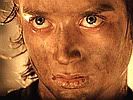
~ Sammath Naur 4: ‘The Ring is mine’, plus jan-u-wine’s “That Which Is My Own”.
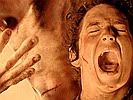
~ Sammath Naur 5: Gollum Bites, plus jan-u-wine’s “Frodo’s Remembrance of Gollum”.

~ Sammath Naur 6: Gollum Falls, plus essay on Gollum’s oath.
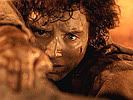
~ Sammath Naur 7: ‘Give Me Your Hand’, plus jan-u-wine’s “Within the Chamber”.
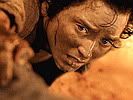
~ Sammath Naur 8: ‘Take my hand’, plus jan-u-wine’s “The Claiming".
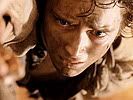
~ Sammath Naur 9: ‘Don't you let go’, plus jan-u-wine’s “In the Garden of the Mind".

~ Sammath Naur 10: ‘Reach’, plus jan-u-wine’s “And I Don’t Mean To".
Other Tables of Links:
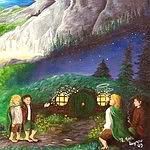
~ Entries with jan-u-wine's poems.


~ Frodo & Elijah Wood screencap entries
~ Mechtild
Warnings: Again, my apologies to dial-up viewers for the many images.
Frodo and Gollum’s fight at the brink is to me iconic, from the opening struggle to the moment when they sail over the edge like warring, fallen angels. Talking about it with verangel in the previous entry, it occurred to me that the film fight is the visualization of the one described in the book, but before Frodo's finger is bitten off, when he's still invisible. Here again is Tolkien's description of it:
[Sam] groped forward, and then he saw a strange and terrible thing. Gollum on the edge of the abyss was fighting like a mad thing with an unseen foe. To and fro he swayed, now so near the brink that almost he tumbled in, now dragging back, falling to the ground, rising, and falling again.
I suppose the film-makers felt they couldn't really do justice to the book fight with an invisible Frodo, so they saved it for when he was visible again-minus the end of his finger, but not his fury. It's a wonderfully choreographed film fight, all the more striking from a distance. The two figures are stark against the golden glow of the background, yet the swirling mists and vapours soften the scene at the same time, giving their desperate struggle an otherworldly look, almost dream-like.
Re-visiting this scene in order to make a fullscreen image of Gollum falling into the fiery abyss, I found the whole sequence so visually and emotionally arresting I decided to make an abbreviated set to post here.
Gollum's fall as seen in the film is a long one; seen in screencaps, it seems to take an eternity. Watching him descend both expands and concentrates the impact of his fall, letting the viewer watch each frame as separate moments, frozen in time, each frame recording a gradation in Gollum’s transition from euphoria to bewilderment to horror to sorrow and dismay at the loss of the treasure he had finally regained. He does not seem even to feel what must be an excruciating death, sinking into molten lava, only the loss of the Ring. It is as if he is already being consumed before the flames ever touch him, the Ring already burning him up from inside. Why should he notice the fire outside? The out-of-focus frames toward the bottom showing Gollum first entering the lava are brilliant, I think. They are very intense, but the out-of-focus quality, perhaps, gives them a surreal look. Looking at them is like looking through a window at Gollum in hell.
It was from this fate that Frodo was saved, Gollum effectively taking his place in the inferno. That Frodo had a sense of this-in the book-is made clear by what he says to Sam about forgiving Gollum, after the Ring is destroyed. Frodo knows what he (and Middle-earth) owes to Gollum's misstep, even if Gollum had not intended to bring this boon. The world, and Frodo, lives. After his initial euphoria passes, Frodo will still have to struggle with the continuing desire for the Ring, and feelings of shame for still desiring it, but his lot will not be Gollum's.
When I look at Gollum's face in this sequence I can’t help feeling pity for him, even love. Wicked as he has been, he is pitiful, so utterly overwhelmed and outmatched by a power far greater than he. In this doomed contest, his end is a terrible one.
Following the screencaps there is a rather extended essay concerning why I think Gollum fell. In it I talk about the importance of Gollum’s oath, and the power words can have in Tolkien’s narrative world. I have also posted book texts bearing on Gollum's oath below the essay.
~*~
Book scene, continued, from Mount Doom:
‘Precious, precious, precious!’ Gollum cried. ‘My Precious! O my Precious!’ And with that, even as his eyes were lifted up to gloat on his prize, he stepped too far, toppled, wavered for a moment on the brink, and then with a shriek he fell. Out of the depths came his last wail Precious, and he was gone.










































I. Long Essay on the power of words in Tolkien, especially as they pertain to Gollum's oath.
In Tolkien’s secondary world, not just the one depicted in LotR, the power of words is very great, for good and for ill. For good, there’s the song of the Ainur, of course, through which they sing Arda into being. It is not clear to me if their song had actual words. I tend to think not, picturing the Ainur communicating in some way more like the Ring-bearers' "mind-speech". Perhaps the Ainur “mind-sang” the world into being, with a music that is music, yet transcends it, using words that are words, yet which transcend what one thinks of as words. When Morgoth brings about the death of the Two Trees and Valinor is darkened, Yavanna, sorrowing, “sings” over them until, at last, they bear the fruits that will become the Moon and Sun.
In LotR, in the world the Ainur’s song created, Middle-earth, speech-both spoken and sung-also has creative, restoring power. Goldberry’s song restores and refreshes Frodo’s spirit. Tom Bombadil’s songs subdue Old Man Willow and the Barrow Wight, not only when Tom sings them, but when Frodo does. Singing the words Tom has taught him and his friends before they set out, he sings in a small desperate voice at first, but his voice grows until the chamber seems to be filled with the noise of drum and trumpet. It is as if the power is in the songs themselves, rather than in the singer, a power that grows in the act of singing. Tom’s song, even sung by Frodo, breaks the hold of the Wight's dark spell and sets the hobbits free. It sets them free literally, by summoning Tom, who comes to them and sings to banish the Wight and release the dreaming hobbits from their bonds. But Tom's song has the power to set them free from the inside, too, lifting the heart of the singer and rousing him to action. Even before Tom comes, Frodo, singing, in spite of the terror of the situation, feels his courage rise within him so that he can act.
When Sam can't find Frodo in the Tower and sits on a step, feeling defeated, the song that comes to him is freeing in the same way. The tune is one of Mr. Bilbo's, but the words, it says, were Sam’s own, coming to him "unbidden". His first tentative murmurings grow to an echoing sound. The dark-defying, stirring verses of "In Western Lands" don't summon Tom Bombadil to his rescue, but they bring “new strength” to Sam’s heart and limbs. And Frodo, in the upper chamber, hears the song and sings back to him, which is how Sam finds him. Thus Sam's and Frodo's hearts are "freed", in a sense-freed from the despair that makes it impossible to act.
In the First Age, Lúthien goes to look for Beren, imprisoned in Angband under Thangorodrim. Desperate to find him in Morgoth’s dungeons, she sings. Beren hears her song, his spirits lift, and he sings back to her. Lúthien comes to him and releases him, and, together, they escape.
When Fëanor’s son, Maedhros is captured by Morgoth and left to hang by his wrist from the sheer side of Thangorodrim (also in the First Age), Fingon enters Morgoth’s domain to look for him. Fingon nearly despairs in his search, but, in defiance of the Orcs hiding all around him, he sings a song of Valinor, “that the Noldor made of old,” in the time before Fëanor’s oath brought strife between the Eldar. Maedhros hears and sings back. Thus Fingon is able to find him and Maedhros is rescued.
All of these rescues, then, are achieved through the power of song, the sung word. (I should note that there are songs of negative power, too: for example, Old Man Willow sings the hobbits to sleep, to ensnare them, similarly the Barrow Wight sings a song that freezes Frodo’s marrow, incapacitating him.)
Words which are not sung also carry great power in Tolkien's world. These are oaths and curses. Yet, like the song Frodo sang in the barrow, which had a power apart from him, the words of oaths and curses also have a power of their own.
When Fëanor pronounces his curse, rejecting the Valar, and vowing to reclaim the Silmarils from Morgoth no matter the cost, his sons and many of his kin join him in his rash oath. The Valar are stunned and horrified. Hot-spirited Fëanor might not realise the power such words can hold, but the Valar do. The way Fëanor’s doom-and the doom of his fellow oath-takers-is played out, the words that he vowed are binding in a way that cannot be gainsaid, not even by Manwë or Varda. The oath has a life of its own to bind the oath-takers, to the death.
When at last only two of Fëanor's sons are left, Maedhros and Maglor, they are still driven by the oath. Against their own hearts they have sacked Doriath and the Havens of Sirion, killing most of the remnant of their people and kin trying to regain the Silmaril of Beren and Lúthien. After the last battle, when the other two Silmarils have been recovered from the crown of Morgoth, Maglor tries to persuade Maedhros to relinquish their claim on the holy jewels, and to repudiate the oath by which their father bound them. They should return to Valinor and plead for mercy. But Maedhros cannot be persuaded. The oath will bind them, he says, sworn as it was to Ilúvatar. The brothers have no choice but to fulfil it. So they each steal a Silmaril, but Maglor's burns him unbearably (for only the pure-hearted can hold one), and he casts it into the Sea. He departs to "wander ever" by the waves, singing, in pain and regret. Maedhros, overcome by anguish and despair, throws himself and his Silmaril into a chasm of fire.
In LotR, when the Men of the White Mountains break their oath of allegiance to Isildur, they are condemned to a twilight existance under the mountain-whether by the power of Isildur's curse or the power of their oath or both-until the time comes that they should fulfil the oath they broke.
And it is with utmost seriousness that Pippin and Merry take oaths to serve their respective lords, Denethor and Théoden. "Until my lord release me, or death take me, or the world end," Pippin swears to the Steward of Gondor. The reader knows he means it not just because Pippin is true-hearted, but because of the world Pippin lives in. In the world of Middle-earth, only the craven break their oaths.
Sometimes there are no oaths. When the Fellowship is setting out, Elrond says that the members purposely are not to be put under oath. Considering the oaths that are used elsewhere in Tolkien, this is striking. Elrond says to them in The Ring Goes South:
‘The others go with [Frodo] as free companions, to help him on his way. You may tarry, or come back, or turn aside into other paths, as chance allows. The further you go, the less easy will it be to withdraw; yet no oath or bond is laid on you to go further than you will. For you do not yet know the strength of your hearts, and you cannot foresee what each may meet upon the road.'
'Faithless is he that says farewell when the road darkens,' said Gimli.
'Maybe,' said Elrond, 'but let him not vow to walk in the dark who has not seen the nightfall.'
'Yet sworn word may strengthen quaking heart,' said Gimli.
'Or break it,' said Elrond.
The Fellowship is about to depart on perhaps the most perilous journey of the Third Age. If any group should, by sheer necessity, be bound to faithfulness by oath, it would be this one. Yet Elrond does a strange and wonderful thing. He proclaims them free of any such binding words, free to stay or to go, just as their hearts prompt them to do.
My own feeling about this is that Elrond, son of Elwing and Eärendil, who knew the whole history of the oath of Fëanor and saw first-hand at the Havens of Sirion what a binding oath could cause, was loath to ever use one again, no matter how pressing the need. Yet ironically, because of his reticence to bind the members of the Fellowship by an oath, he ended up asking them to bind themselves by something far stronger: the ties of love. Jan-u-wine, proof-reading a first draft of this post, lifted up this facet of what Elrond had to say.
She wrote,
[T]he one thing that truly resonated was your comment on the oath that the Fellowship took, a very interesting one in terms of it being different from the sorts that people in Tolkien's worlds normally were involved in: an oath involving free moral choice, choice made moment to moment in what would be known (even from the start) to be very difficult moments. It is interesting to me, in thinking on it, that this oath, seemingly more "kind" than others, was (to those of a truly moral bent) more binding than any other, by being "less" so.
There are oaths that propel one forward out of fear, and there are those that propel one forward out of thought, spirit, heart. That was the oath that the Fellowship took, I deem. One that could be severed by death, for never would they choose to turn aside from it, being impelled, from the start, by the right motive: love. In any situation where one is impelled, there is the impeller (or?) and the impellee. Elrond gave no thought, apparently, to set them on this road in any other manner save the one that was fitting: he impelled through love. How different might the Quest have been had it begun with oaths sworn by means other than love and free will.
Sometimes I think that such oaths, since they might not be undertaken for the right reasons, or not "held", in future, for the right reasons, are bound to fail. Only the oath taken in love, with love, it seems to me, has any chance of success. All else has the hint of the lie, the hint of *coercion* in it. And coercion has everything to do with Sauron. These people needed to be free of any but the purest "slavery" of all: the slavery of selfless love.
Oath-breaking is not unknown in the real world. Tolkien was not ignorant of history. In my own culture, promise-breaking is so pervasive that it largely goes unremarked. But the taking of oaths in Tolkien’s secondary world was a grave thing with grave consequences for oath-breaking. One of the truest examples of these sad consequences is the doom which found Gollum in the Sammath Naur.
Many readers have argued about why Gollum fell to his death in the Sammath Naur. Obviously, in the first place he fell because it was necessary. Someone had to destroy the Ring in order for the story to be properly resolved. It couldn’t be Frodo, since the Ring was carefully portrayed as something irresistible, to which anyone who carried it would, eventually, succumb. As a first-time reader, although I was shocked that Frodo's will was overpowered in the Sammath Naur so that he claimed the Ring, the clues were there, all along. If Gandalf and Galadriel would not take the Ring, so sure were they that they would be overpowered by It, what made me think Frodo would be able to withstand It? I suppose I just wanted him to, by virtue of his goodness and my love for him as a character.
But, apart from the needs of the plot, was there no other reason Gollum had to fall, Gollum in particular? Negative critics of LotR have pointed to the unlikelihood that Gollum would “just happen” to slip on the brink of the Crack of Doom, calling it transparently convenient, as well as unlikely. Here was a character who had spent the story prowling skillfully through every sort of terrain, even climbing down the face of precipices head-first, "like a spider". Why lose his footing in the Sammath Naur except as a thinly-disguised plot device-a means to a narrative end?
Against all logic I’ve always had a gut feeling that Gollum's death satisfied some sort of internal logic to the larger story-but I could never put my finger on it. In order to prepare this series, particularly to discuss the way the film portrayed Gollum treating his oath lightly in some film scenes*, I did more background reading in the book. My answer was right there, in the text.
It is in the Emyn Muil that Frodo first extracts an oath from Gollum. Gollum promises “to be very very good”, and to “never, never, let Him [Sauron] have it”. He will save it, he vows. He will “serve the master of the Precious” (all of these quotes are cited in full below). But Frodo is no fool. When Gollum says he wants to swear on the Precious, Frodo issues a stern warning:
‘On the Precious? How dare you?’ he said. ‘Think! ... One Ring to rule them all and in the Darkness bind them. ... Would you commit your promise to that, Sméagol? It will hold you. But it is more treacherous than you are. It may twist your words. Beware!’
In the Dead Marshes, when Sam overhears Gollum arguing with himself, Gollum is first shown twisting the original meaning of his oath to suit his needs. He muses, if he took the Ring, then he would be the master of the Precious. And he had promised "to serve the master of the Precious”.... Gollum has not yet reached the stage where his plans include murder, but he's getting there.
At the Black Gate, when Frodo asks Gollum about his alternative plan to enter Mordor via the Morgul pass, Frodo reminds him of the binding nature of the oath, and its perilousness.
‘Sméagol,’ he said, ‘I will trust you once more. (…) But I warn you, Sméagol, you are in danger.’ (…) I [do] not mean the danger that we all share,’ said Frodo. ‘I mean a danger to yourself alone. You swore a promise by what you call the Precious. Remember that! It will hold you to it; but it will seek a way to twist it to your own undoing. Already you are being twisted. You revealed yourself to me just now, foolishly. Give it back to Sméagol you said. Do not say that again! Do not let that thought betray you to a bitter end. You will never get it back. In the last need, Sméagol, I should put on the Precious; and the Precious mastered you long ago. If I, wearing it, were to command you, you would obey, even if it were to leap from a precipice or to cast yourself into the fire. And such would be my command. So have a care, Sméagol!’
Gollum is terrified and abashed by this speech, and Frodo and Sam have to wait a long while for him to collect himself. But, for this essay, the crucial thing again is that Frodo emphasizes a) that the oath is binding b) that the oath, sworn on such an object as the Ring, will twist the mind of the oath-taker, and c), if the oath-taker lets It [twist his oath], the Ring will “betray him to a bitter end.”
Gollum does continue to acknowldedge the gravity of the oath he’s made, as shown by his behaviour at the pool below Henneth Annun. When, in order to save him from Faramir’s archers, Frodo tries to get Gollum to come to him and Gollum won’t, Frodo resorts to threats, threats based on the Ring-oath. “Precious will be angry,” he says, desperate to persuade Gollum. “I shall take Precious, and I shall say: make him swallow the bones and choke. Never taste fish again. Come, Precious is waiting!” Gollum comes.
Later, after Gollum has been captured and taken before Faramir, he is asked on what basis Faramir should accept his word that he will keep the hideout secret. “Master knows,” Gollum answers. “Sméagol promises to Precious, promises faithfully. Never come again, never speak, no never.” I think the reader as well as Faramir is meant to understand Gollum’s promise as a sincere one.
The final stage of Gollum twisting his promise is seen on the road to the Morgul Vale. He says to himself, “[W]hen She throws away the bones and empty garments, we shall find it, we shall get it, the Precious, a reward for poor Sméagol who brings nice food. And we’ll save the Precious, as we promised” (my emphases).
Thus, what happens at the Sammath Naur, in a sense, is already foredoomed. When Gollum goes so far as to arrange the killing of Frodo by Shelob (and then goes through with it), even though Frodo manages to escape from her sting, Gollum has already broken the oath, twisting it to suit his needs, just as Frodo warned he would be tempted to do. If in Tolkien's world oaths are never broken without consequences-the more dire the oath, the more dire the consequences-then Gollum's fall is not a thing of chance, but something inevitable.
Gollum bit Frodo in the Sammath Naur, wounding Frodo, and, ironically, saving him, body and soul. But Gollum is bitten, too-fatally-not by Frodo but by his own oath.
*By “some film scenes”, I mean the scene in Shelob’s Lair in which Gollum attacks Frodo, and the EE version of the scene on the slopes of Mt. Doom in which Gollum, smirking, tells Frodo his promise was a lie.
~*~
II. Book scenes from The Two Towers, dealing with Gollum's oath:
1.~~The Taming of Sméagol:
‘It hurts us, it hurts us,’ hissed Gollum. ‘It freezes, it bites! Elves twisted it, curse them! Nasty cruel hobbits! That’s why we tries to escape, of course it is, precious. We guessed they were cruel hobbits. They visits Elves, fierce Elves with bright eyes. Take it off us! It hurts us.’
‘No, I will not take it off you,’ said Frodo, ‘not unless’-he paused a moment in thought-‘not unless there is any promise you can make that I can trust.’
‘We will swear to do what he wants, yes, yess,’ said Gollum, still twisting and grabbing at his ankle. ‘It hurts us.’
‘Swear?’ said Frodo.
‘Sméagol,’ said Gollum suddenly and clearly, opening his eyes wide and staring at Frodo with a strange light. ‘Sméagol will swear on the Precious.’
Frodo drew himself up, and again Sam was startled by his words and his stern voice. ‘On the Precious? How dare you?’ he said. ‘Think!'
'One Ring to rule them all and in the Darkness bind them.'
'Would you commit your promise to that, Sméagol? It will hold you. But it is more treacherous than you are. It may twist your words. Beware!’
Gollum cowered. ‘On the Precious, on the Precious!’ he repeated.
‘And what would you swear?’ asked Frodo.
‘To be very very good,’ said Gollum. Then crawling to Frodo’s feet he grovelled before him, whispering hoarsely: a shudder ran over him, as if the words shook his very bones with fear. ‘Sméagol will swear never, never, to let Him have it. Never! Sméagol will save it. But he must swear on the Precious.’
‘No! not on it,’ said Frodo, looking down at him with stern pity. ‘All you wish is to see it and touch it, if you can, though you know it would drive you mad. Not on it. Swear by it, if you will. For you know where it is. Yes, you know, Sméagol. It is before you.’
For a moment it appeared to Sam that his master had grown and Gollum had shrunk: a tall stern shadow, a mighty lord who hid his brightness in grey cloud, and at his feet a little whining dog. Yet the two were in some way akin and not alien: they could reach one another’s minds. Gollum raised himself and began pawing at Frodo, fawning at his knees.
‘Down! down!’ said Frodo. ‘Now speak your promise!’
‘We promises, yes I promise!’ said Gollum. ‘I will serve the master of the Precious. Good master, good Sméagol, gollum, gollum!’ Suddenly he began to weep and bite at his ankle again.
‘Take the rope off, Sam!’ said Frodo.
2.~~The Passage of the Marshes:
[Gollum and Sméagol argue with each other as Sam, presumably asleep, listens.]
‘Sméagol promised,’ said the first thought.
‘Yes, yes, my precious,’ came the answer, ‘we promised: to save our Precious, not to let Him have it-never. But it’s going to Him, yes, nearer every step. What’s the hobbit going to do with it, we wonders yes we wonders.’
‘I don’t know. I can’t help it. Master’s got it. Sméagol promised to help the master.’
‘Yes, yes, to help the master: the master of the Precious. But if we was master, then we could help ourselves, yes, and still keep promises.’
‘But Sméagol said he would be very very good. Nice hobbit! He took cruel rope off Sméagol’s leg. He speaks nicely to me.’
‘Very very good, eh, my precious? Let’s be good, good as fish, sweet one, but to ourselves. Not hurt the nice hobbit, of course, no, no.’
‘But the Precious holds the promise,’ the voice of Sméagol objected.
‘Then take it,’ said the other, ‘and let’s hold it ourselves! Then we shall be master, gollum! Make the other hobbit, the nasty suspicious hobbit, make him crawl, yes, gollum!’
‘But not the nice hobbit?’
‘Oh no, not if it doesn’t please us. Still he’s a Baggins, my precious, yes, a Baggins. A Baggins stole it. He found it and he said nothing, nothing. We hates Baggins.’
‘No, not this Baggins.’
‘Yes, every Baggins. All peoples that keep the Precious. We must have it!’
‘But He’ll see. He’ll know. He’ll take it from us!’
‘He sees. He knows. He heard us make silly promises-against his orders, yes. Must take it. The Wraiths are searching. Must take it.’
‘Not for Him!’
‘No, sweet one. See, my precious: if we has it, then we can escape, even from Him, eh?’
3.~~The Black Gate is Closed:
‘Sméagol,’ he said, ‘I will trust you once more. Indeed it seems that I must do so, and that it is my fate to receive help from you, where I least looked for it, and your fate to help me whom you long pursued with evil purpose. So far you have deserved well of me and kept your promise truly. Truly, I say and mean,’ he added with a glance at Sam, ‘for twice now we have been in your power, and you have done no harm to us. Nor have you tried to take form me what you once sought. May the third time prove the best! But I warn you, Sméagol, you are in danger.’
‘Yes, yes, master!’ said Gollum. ‘Dreadful danger! Sméagol’s bones shake to think of it, but he doesn’t run away. He must help nice master.’
‘I did not mean the danger that we all share,’ said Frodo. ‘I mean a danger to yourself alone. You swore a promise by what you call the Precious. Remember that! It will hold you to it; but it will seek a way to twist it to your own undoing. Already you are being twisted. You revealed yourself to me just now, foolishly. Give it back to Sméagol you said. Do not say that again! Do not let that thought betray you to a bitter end. You will never get it back. In the last need, Sméagol, I should put on the Precious; and the Precious mastered you long ago. If I, wearing it, were to command you, you would obey, even if it were to leap from a precipice or to cast yourself into the fire. And such would be my command. So have a care, Sméagol!’
(…) [T]his speech abashed and terrified him. He grovelled on the ground and could speak no clear word but nice master.
Frodo waited patiently for a while, then he spoke again less sternly. ‘Come now, Gollum or Sméagol if you wish, tell me of this other way, and show me, if you can, what hope there is in it, enough to justify me in turning aside from my plain path. I am in haste.’
But Gollum was in a pitiable state, and Frodo’s threat had quite unnerved him. It was not easy to get any clear account out of him, amid his mumblings and squeakings, and the frequent interruptions in which he crawled on the floor and begged them both to be kind to ‘poor little Sméagol’.
4.~~The Forbidden Pool:
‘Come, Sméagol!’ said Frodo. ‘Bring fish with you. Come!’
‘No!’ said the voice. ‘Not nice Master. Leaves poor Sméagol and goes with new friends. Master can wait. Sméagol hasn’t finished.’
‘There’s no time,’ said Frodo. ‘Bring fish with you. Come!’
‘No! Must finish fish.’
‘Sméagol!’ said Frodo desperately. ‘Precious will be angry. I shall take Precious, and I shall say: make him swallow the bones and choke. Never taste fish again. Come, Precious is waiting!’
There was a sharp hiss. Presently out of the darkness Gollum came crawling on all fours, like an erring dog called to heel. He had a half-eaten fish in his mouth and another in his hand. He came close to Frodo, almost nose to nose, and sniffed at him. His pale eyes were shining. Then he took the fish out of his mouth and stood up.
‘Nice Master!’ he whispered. ‘Nice hobbit, come back to poor Sméagol. Good Sméagol comes. Now let’s go, go quickly, yes. Through the trees, while the Faces are dark. Yes, come, let’s go!’
(…)
‘Come hither!’ said Faramir. ‘Look at me! Do you know the name of this place? Have you been here before?’
Slowly Gollum raised his eyes and looked unwillingly into Faramir’s. All light went out of them, and they stared bleak and pale for a moment into the clear unwavering eyes of the man of Gondor. There was a still silence. Then Gollum dropped his head and shrank down, until he was squatting on the floor, shivering. ‘We doesn’t know and we doesn’t want to know,’ he whimpered. ‘Never came here; never come again.’
‘There are locked doors and closed windows in your mind, and dark rooms behind them,’ said Faramir. ‘But in this I judge that you speak the truth. It is well for you. What oath will you swear never to return; and never to lead any living creature hither by word or sign?’
‘Master knows,’ said Gollum with a sidelong glance at Frodo. ‘Yes, he knows. We will promise Master, if he saves us. We’ll promise to It, yes.’ He crawled to Frodo’s feet. ‘Save us, nice Master!’ he whined. ‘Sméagol promises to Precious, promises faithfully. Never come again, never speak, no never. No, precious, no!’
5.~~Shelob's Lair:
[Shelob] lusted for sweeter meat. And Gollum had brought it to her.
‘We’ll see, we’ll see,’ he said often to himself, when the evil mood was on him, as he walked the dangerous road from Emyn Muil to Morgul Vale, ‘we’ll see. It may well be, O yes, it may well be that when She throws away the bones and empty garments, we shall find it, we shall get it, the Precious, a reward for poor Sméagol who brings nice food. And we’ll save the Precious, as we promised.’ (…)
~*~
Entries in this series:
~ Sammath Naur Intro: "Why I fell for Frodo” ~ Main essay for series (this essay is friends locked).
~ Sammath Naur 1: ‘I’m here, Sam.’
~ Sammath Naur 2: ‘Throw It in the fire!’
~ Sammath Naur 3: ‘Just let It go!’, plus three poems by jan-u-wine.
~ Sammath Naur 4: ‘The Ring is mine’, plus jan-u-wine’s “That Which Is My Own”.
~ Sammath Naur 5: Gollum Bites, plus jan-u-wine’s “Frodo’s Remembrance of Gollum”.
~ Sammath Naur 6: Gollum Falls, plus essay on Gollum’s oath.
~ Sammath Naur 7: ‘Give Me Your Hand’, plus jan-u-wine’s “Within the Chamber”.
~ Sammath Naur 8: ‘Take my hand’, plus jan-u-wine’s “The Claiming".
~ Sammath Naur 9: ‘Don't you let go’, plus jan-u-wine’s “In the Garden of the Mind".
~ Sammath Naur 10: ‘Reach’, plus jan-u-wine’s “And I Don’t Mean To".
Other Tables of Links:
~ Entries with jan-u-wine's poems.
~ Frodo & Elijah Wood screencap entries
~ Mechtild